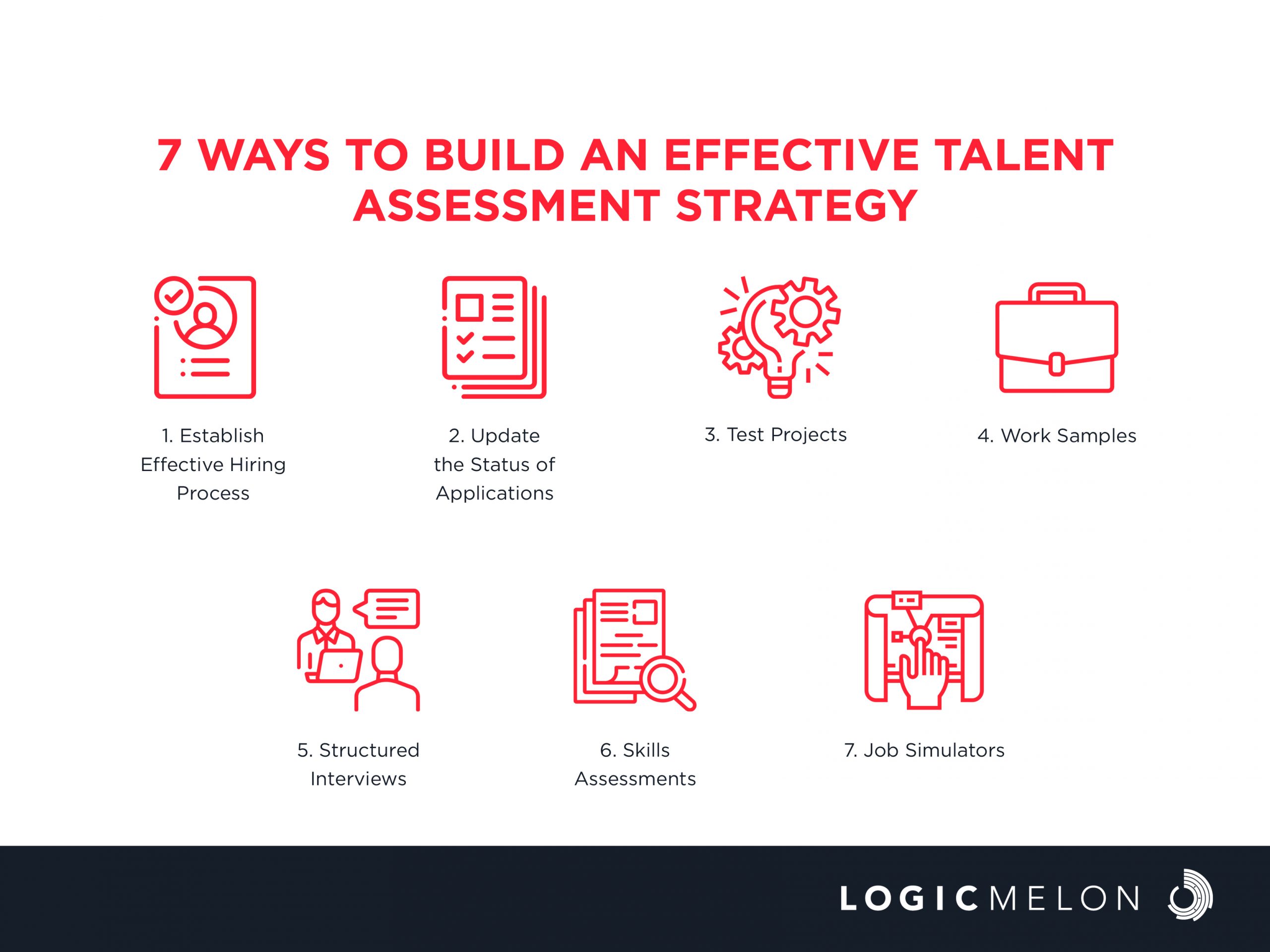7 Ways to Build an Effective Talent Assessment Strategy
What is Talent Assessment?
A talent assessment is the best way to identify whether the candidates can perform at their best and be the right cultural fit.
This assessment will aim to predict new hires on the job performance and how long they will work for the company.
Talent assessments are effective recruitment management tools for hiring the right person for the right role, evaluating candidates for promotion, and managing and developing candidates.
A powerful tool for assessing job applicants and companies can use these tests as a part of the application process along with the resume.
The Uses of Talent Assessment
- This talent assessment help determine the culture fit, skill level, motivation level, versatility and job aptitude. Talent assessments are based on extensive research and test the personality of a person.
- These tests are critical components for company performance and success by providing a tangible business impact. Talent assessment provides invaluable data-driven insights on defining, strategizing and developing activities.
- Provides data on the extent to which the candidate’s skills and abilities align with the hiring needs.
- Develops trust for candidates in the organisation that you care about their skills and have a data-driven process while assessing them.
7 Ways to Build an Effective Talent Assessment Strategy
The hiring team can utilise these multiple talent assessment tests and can share the results with prospective employees.
An effective talent assessment strategy has to be transparent, and unbiased, should align with the objectives of the company and must be fair to all the candidates.

1. Establish Effective Hiring Process
An effective hiring process is important for a good talent assessment strategy. A talent assessment test consists of a series of questions, and job simulators for the employers to assess the applicant’s performance and competency for a role.
These tests help to evaluate the candidate’s skills, knowledge, work style and other personality traits to ascertain their analytical attributes, interpersonal skills and leadership skills.
2. Update the Status of Applications
Update the status of their application to keep the candidate stay interested in the role. Proper recruitment assessment tools help organisations to update the candidate in an effective and timely manner.
3. Test Projects
Test projects or trail work are projects mostly requested by the company to assess the quality of work done by the candidate to find their potential.
This is a process where the new hires are evaluated by assessing how they deal with the projects through their experience related to the work.
4. Work Samples
Work samples come from candidates who have previously worked relating to this field and can have a chance to prove their skills through these samples.
In other words, A work sample is a project that the applicants are requested to bring to the job interview.
These samples are reviewed by the hiring manager as examples of work the applicant can produce and the review of the project becomes a part of the overall selection process.
5. Structured Interviews
A structured interview helps to assess the potential talented candidate in real-time, and how they deal with issues relating to the work.
Asynchronous video interviews are online hiring assessment tools which help in concentrating on each candidate’s skills and help to minimise hiring bias. They open up multiple pools of interviewers helps in allowing more skills to shine through.
6. Skills Assessments
Skill assessment tests are a popular method for screening a job candidate. These tests will highlight skills and personality traits that an applicant may have left off on their resumes.
They also have a chance to prove the skills mentioned in their resume, so that companies can reassure employers that a new hire is as skilled as they have documented in their application.
7. Job Simulators
Some of the job simulators are:
- Coding Simulators give the recruiters insights into candidates’ understanding of applicant’s know-how, to evaluate them on programming languages like Java, Python, and C++. The recruiters have a chance to shortlist these candidates with good scores in coding assessments.
- Personality Traits refer to the pattern of thoughts and feelings for a leadership position.
- Behavioral Traits are the candidate assessment tool used by the recruiter for measuring the applicant’s underlying behavioral traits. These mainly refer to the applicant’s pattern of responses to certain situations. This shows how a person actually handles the situation when the problem arises during work.
- Cognitive ability tests are a branch of tests that measures the applicant’s critical thinking, verbal reasoning, numerical aptitude tests, and problem-solving skills. This assessment predicts the job training observation, particularly in complex situations.
- Communication skills assessments measure the candidate’s pronunciation, fluency, grammar, and listening comprehension skills.
- Technical skills are the candidate’s knowledge about the specific job role. During this assessment, the candidate’s skills and knowledge about their domain are tested.
Frequently Asked Questions
1. How do structured interviews help in creating an effective talent assessment strategy?
Structured interviews help organisations to find the character and personality traits of the potential candidate. This is an effective way of comparing one applicant with another and organisations can evaluate them on the basis of the score scale.
2. How do you measure talent performance?
Time to fill, short-term turnover, cost per hire, offer acceptance rate and quality of hire are the factors for measuring talent performance.
3. Why is assessing talent important for the organisation?
Talent assessments are effective tools for hiring the right person for the right job and evaluating the candidates for managing the candidate, developing the team members, and understanding which people will make up the workforce.
4. What is a talent scorecard?
A talent scorecard is a list of skills, traits and qualifications that someone will need to have certain skills in order to be successful in the role. These attributes are tested and verified during a structured interview.
Closing Thoughts
Organisations to gain insight on whether candidates can do the job you’re hiring for and also if they fit well in your company culture and team. Using an effective talent assessment strategy helps reduce the number of candidates who qualify for the job.
A talent assessment test is a structured process that employers use to identify the right job candidate for the open position in the organisation.
A talent assessment comprises various kinds of questions, requests for work samples, and job simulations that employers can use for assessing the applicant’s performance and testing their competency for the role. Talent assessment framework enables the recruiter and hiring managers to find the quality talented candidates that will fit into the company culture.
Talent assessment tools enable hiring managers to test candidates’ skills and evaluate candidates based on the desired criteria set by the organisation.
The talent assessment process is instrumental for the company’s growth and helps them to identify the most qualified candidate.
LogicMelon
Award-winning recruitment software that will find, attract, hire and analyse the way you want to work. At LogicMelon, we have experienced software recruitment marketing specialists to help you build effective recruitment solutions supported by the best customer service you’ll find anywhere!
Email: [email protected] or call LogicMelon (UK) +44 (0) 203 553 3667 (USA) +1 860 269 3089
What is Talent Assessment?
A talent assessment is the best way to identify whether the candidates can perform at their best and be the right cultural fit.
This assessment will aim to predict new hires on the job performance and how long they will work for the company.
Talent assessments are effective recruitment management tools for hiring the right person for the right role, evaluating candidates for promotion, and managing and developing candidates.
A powerful tool for assessing job applicants and companies can use these tests as a part of the application process along with the resume.
The Uses of Talent Assessment
- This talent assessment help determine the culture fit, skill level, motivation level, versatility and job aptitude. Talent assessments are based on extensive research and test the personality of a person.
- These tests are critical components for company performance and success by providing a tangible business impact. Talent assessment provides invaluable data-driven insights on defining, strategizing and developing activities.
- Provides data on the extent to which the candidate’s skills and abilities align with the hiring needs.
- Develops trust for candidates in the organisation that you care about their skills and have a data-driven process while assessing them.
7 Ways to Build an Effective Talent Assessment Strategy
The hiring team can utilise these multiple talent assessment tests and can share the results with prospective employees.
An effective talent assessment strategy has to be transparent, and unbiased, should align with the objectives of the company and must be fair to all the candidates.

1. Establish Effective Hiring Process
An effective hiring process is important for a good talent assessment strategy. A talent assessment test consists of a series of questions, and job simulators for the employers to assess the applicant’s performance and competency for a role.
These tests help to evaluate the candidate’s skills, knowledge, work style and other personality traits to ascertain their analytical attributes, interpersonal skills and leadership skills.
2. Update the Status of Applications
Update the status of their application to keep the candidate stay interested in the role. Proper recruitment assessment tools help organisations to update the candidate in an effective and timely manner.
3. Test Projects
Test projects or trail work are projects mostly requested by the company to assess the quality of work done by the candidate to find their potential.
This is a process where the new hires are evaluated by assessing how they deal with the projects through their experience related to the work.
4. Work Samples
Work samples come from candidates who have previously worked relating to this field and can have a chance to prove their skills through these samples.
In other words, A work sample is a project that the applicants are requested to bring to the job interview.
These samples are reviewed by the hiring manager as examples of work the applicant can produce and the review of the project becomes a part of the overall selection process.
5. Structured Interviews
A structured interview helps to assess the potential talented candidate in real-time, and how they deal with issues relating to the work.
Asynchronous video interviews are online hiring assessment tools which help in concentrating on each candidate’s skills and help to minimise hiring bias. They open up multiple pools of interviewers helps in allowing more skills to shine through.
6. Skills Assessments
Skill assessment tests are a popular method for screening a job candidate. These tests will highlight skills and personality traits that an applicant may have left off on their resumes.
They also have a chance to prove the skills mentioned in their resume, so that companies can reassure employers that a new hire is as skilled as they have documented in their application.
7. Job Simulators
Some of the job simulators are:
- Coding Simulators give the recruiters insights into candidates’ understanding of applicant’s know-how, to evaluate them on programming languages like Java, Python, and C++. The recruiters have a chance to shortlist these candidates with good scores in coding assessments.
- Personality Traits refer to the pattern of thoughts and feelings for a leadership position.
- Behavioral Traits are the candidate assessment tool used by the recruiter for measuring the applicant’s underlying behavioral traits. These mainly refer to the applicant’s pattern of responses to certain situations. This shows how a person actually handles the situation when the problem arises during work.
- Cognitive ability tests are a branch of tests that measures the applicant’s critical thinking, verbal reasoning, numerical aptitude tests, and problem-solving skills. This assessment predicts the job training observation, particularly in complex situations.
- Communication skills assessments measure the candidate’s pronunciation, fluency, grammar, and listening comprehension skills.
- Technical skills are the candidate’s knowledge about the specific job role. During this assessment, the candidate’s skills and knowledge about their domain are tested.
Frequently Asked Questions
1. How do structured interviews help in creating an effective talent assessment strategy?
Structured interviews help organisations to find the character and personality traits of the potential candidate. This is an effective way of comparing one applicant with another and organisations can evaluate them on the basis of the score scale.
2. How do you measure talent performance?
Time to fill, short-term turnover, cost per hire, offer acceptance rate and quality of hire are the factors for measuring talent performance.
3. Why is assessing talent important for the organisation?
Talent assessments are effective tools for hiring the right person for the right job and evaluating the candidates for managing the candidate, developing the team members, and understanding which people will make up the workforce.
4. What is a talent scorecard?
A talent scorecard is a list of skills, traits and qualifications that someone will need to have certain skills in order to be successful in the role. These attributes are tested and verified during a structured interview.
Closing Thoughts
Organisations to gain insight on whether candidates can do the job you’re hiring for and also if they fit well in your company culture and team. Using an effective talent assessment strategy helps reduce the number of candidates who qualify for the job.
A talent assessment test is a structured process that employers use to identify the right job candidate for the open position in the organisation.
A talent assessment comprises various kinds of questions, requests for work samples, and job simulations that employers can use for assessing the applicant’s performance and testing their competency for the role. Talent assessment framework enables the recruiter and hiring managers to find the quality talented candidates that will fit into the company culture.
Talent assessment tools enable hiring managers to test candidates’ skills and evaluate candidates based on the desired criteria set by the organisation.
The talent assessment process is instrumental for the company’s growth and helps them to identify the most qualified candidate.
LogicMelon
Award-winning recruitment software that will find, attract, hire and analyse the way you want to work. At LogicMelon, we have experienced software recruitment marketing specialists to help you build effective recruitment solutions supported by the best customer service you’ll find anywhere!
Email: [email protected] or call LogicMelon (UK) +44 (0) 203 553 3667 (USA) +1 860 269 3089
Recruitment Data Visualisation: Everything You Must Know
As a recruiter, you go through a lot of information daily. Recruitment data visualisation simplifies the complex data, making it easier to understand and act upon.
The Role of Soft Skills in Leadership Recruitment
In leadership development, soft skills are essential for identifying individuals who can not only manage but also inspire and guide teams to success.
ATS and CRM in Talent Acquisition
By utilising the strengths of ATS and CRM, organisations can create a comprehensive talent acquisition strategy that combines relationship building with an efficient hiring process.


